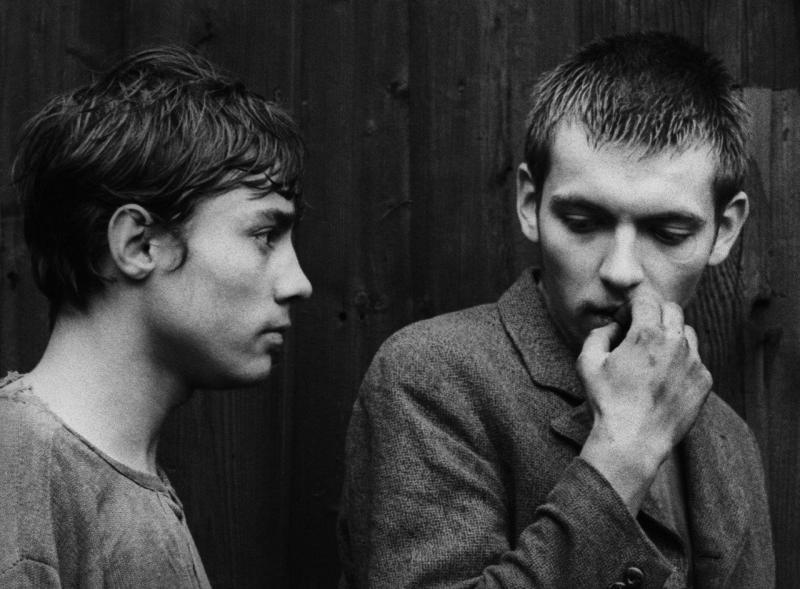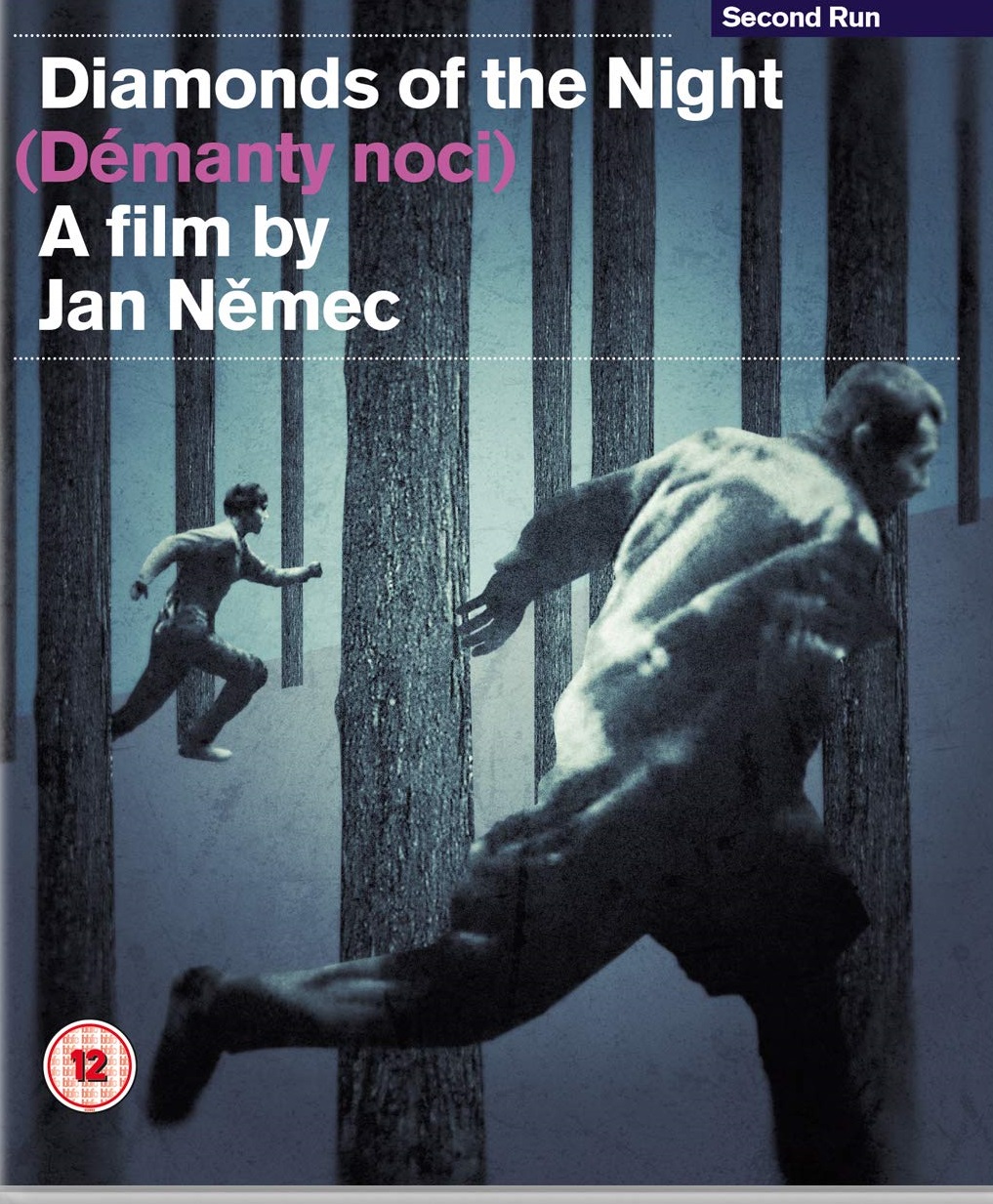Blu-ray: Diamonds of the Night | reviews, news & interviews
Blu-ray: Diamonds of the Night
Blu-ray: Diamonds of the Night
Jan Němec’s existential Czech New Wave thriller is visceral viewing

The opening shot of Jan Němec’s 1964 debut feature, Diamonds of the Night, recalls the start of Orson Welles’s Touch of Evil.
There’s almost no dialogue, and frequent jump cuts take us back to events real and imaginary. Flashbacks show the boys slumped in a moving goods wagon, or travelling through Prague on foot and by tram. Both wear long coats daubed with the letters “KL”, indicating that they’re bound for the camp, though no reference is made to their Jewishness. Played by Ladislav Jánsky and Antonin Kumbera, they’re not even named, having already lost any sense of self. One runs through a decrepit tram carriage towards a pair of officials, the footage deliberately overexposed. The confusion quickly makes complete sense. It’s as if we’re in the boys’ heads: confused, hungry and exhausted to the point of delirium. Němec was a graduate of FAMU, Prague’s famous film school, and knew his stuff: the imaginative use of sound pays homage to Robert Bresson and a wince-inducing shot of one of the boys’ eye sockets covered in ants nods to Bunuel’s Un Chien Andalou.
 There’s a glimpse of a farmer ploughing a field and the woman bringing him food, prompting the boys to follow her to the farmhouse. We next see several versions of what may or may not have played out: the woman is violently attacked, or seduced, or feeds the boys. Presumably the latter, as we later see her staring out at them. After which the two fugitives are captured by a troupe of elderly armed men. The pair crouch against a wall, their toothless captors drinking in celebration. The ending is deliberately inconclusive.
There’s a glimpse of a farmer ploughing a field and the woman bringing him food, prompting the boys to follow her to the farmhouse. We next see several versions of what may or may not have played out: the woman is violently attacked, or seduced, or feeds the boys. Presumably the latter, as we later see her staring out at them. After which the two fugitives are captured by a troupe of elderly armed men. The pair crouch against a wall, their toothless captors drinking in celebration. The ending is deliberately inconclusive.
Diamonds stands up brilliantly 55 years on, a Czech New Wave thriller that’s both artistically challenging and thrillingly dramatic. Lustig was impressed, stating that it was his favourite among adaptations of his novels. Němec enjoyed several years of creative freedom before the Soviet invasion. He left Czechoslovakia in 1974 and pitched up in Hollywood: the bonus appreciation with film historian Peter Hames tells of Němec directing wedding videos as a hack for hire. He assisted director Philip Kaufmann during the making of The Unbearable Lightness of Being and returned to Prague in 1989, working intermittently until his death in 2016.
Presented from the 4K restoration that screened at Cannes last year, this Second Run release, a Blu-ray world premiere, includes Němec’s harrowing debut short film A Loaf of Bread (1960), also based on a story by Lustig. Michael Brooke’s booklet essay and commentary are useful, as is a bonus interview with Lustig’s film director daughter Eva Lustigová.
rating
Share this article
The future of Arts Journalism
You can stop theartsdesk.com closing!
We urgently need financing to survive. Our fundraising drive has thus far raised £49,000 but we need to reach £100,000 or we will be forced to close. Please contribute here: https://gofund.me/c3f6033d
And if you can forward this information to anyone who might assist, we’d be grateful.

Subscribe to theartsdesk.com
Thank you for continuing to read our work on theartsdesk.com. For unlimited access to every article in its entirety, including our archive of more than 15,000 pieces, we're asking for £5 per month or £40 per year. We feel it's a very good deal, and hope you do too.
To take a subscription now simply click here.
And if you're looking for that extra gift for a friend or family member, why not treat them to a theartsdesk.com gift subscription?
more Film
 London Film Festival 2025 - crime, punishment, pop stars and shrinks
Daniel Craig investigates, Jodie Foster speaks French and Colin Farrell has a gambling habit
London Film Festival 2025 - crime, punishment, pop stars and shrinks
Daniel Craig investigates, Jodie Foster speaks French and Colin Farrell has a gambling habit
 I Swear review - taking stock of Tourette's
A sharp and moving tale of cuss-words and tics
I Swear review - taking stock of Tourette's
A sharp and moving tale of cuss-words and tics
 A House of Dynamite review - the final countdown
Kathryn Bigelow's cautionary tale sets the nuclear clock ticking again
A House of Dynamite review - the final countdown
Kathryn Bigelow's cautionary tale sets the nuclear clock ticking again
 theartsdesk Q&A: Idris Elba on playing a US President faced with a missile crisis in 'A House of Dynamite'
The star talks about Presidential decision-making when millions of lives are imperilled
theartsdesk Q&A: Idris Elba on playing a US President faced with a missile crisis in 'A House of Dynamite'
The star talks about Presidential decision-making when millions of lives are imperilled
 Urchin review - superb homeless drama
Frank Dillane gives a star-making turn in Harris Dickinson’s impressive directorial debut
Urchin review - superb homeless drama
Frank Dillane gives a star-making turn in Harris Dickinson’s impressive directorial debut
 Mr Blake at Your Service review - John Malkovich in unlikely role as an English butler
Weird comedy directed by novelist Gilles Legardinier
Mr Blake at Your Service review - John Malkovich in unlikely role as an English butler
Weird comedy directed by novelist Gilles Legardinier
 Don't Let's Go to the Dogs Tonight review - vivid adaptation of a memoir about a Rhodesian childhood
Embeth Davidtz delivers an impressive directing debut and an exceptional child star
Don't Let's Go to the Dogs Tonight review - vivid adaptation of a memoir about a Rhodesian childhood
Embeth Davidtz delivers an impressive directing debut and an exceptional child star
 One Battle After Another review - Paul Thomas Anderson satirises America's culture wars
Leonardo DiCaprio, Teyana Taylor, and Sean Penn star in a rollercoasting political thriller
One Battle After Another review - Paul Thomas Anderson satirises America's culture wars
Leonardo DiCaprio, Teyana Taylor, and Sean Penn star in a rollercoasting political thriller
 Steve review - educator in crisis
Cillian Murphy excels as a troubled headmaster working with delinquent boys
Steve review - educator in crisis
Cillian Murphy excels as a troubled headmaster working with delinquent boys
 Can I get a Witness? review - time to die before you get old
Ann Marie Fleming directs Sandra Oh in dystopian fantasy that fails to ignite
Can I get a Witness? review - time to die before you get old
Ann Marie Fleming directs Sandra Oh in dystopian fantasy that fails to ignite
 Happyend review - the kids are never alright
In this futuristic blackboard jungle everything is a bit too manicured
Happyend review - the kids are never alright
In this futuristic blackboard jungle everything is a bit too manicured

Add comment